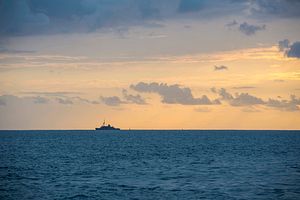On April 17, 2019, Philippine Defense Secretary Deflin Lorenzana visited Tokyo and met Defense Minister Takeshi Iwaya. Both sides agreed to further enhance their countries’ increasingly close security relationship.
Lorenzana visited Japan as the two countries mark the 10th anniversary of the establishment of the Philippines-Japan strategic partnership. In a span of just a decade, Philippines-Japan ties were transformed from a largely economic and development centered relationship to one which also focuses on security cooperation.
In 2009, against the backdrop of the global financial crisis and shortly after Philippine legislative concurrence with the free trade agreement with Japan, the strategic partnership was established through a joint statement. In 2011, the two countries issued a joint statement on the “comprehensive promotion” of their strategic partnership. Unlike the 2009 declaration, the 2011 statement included more provisions on bilateral security cooperation. Nearly four years later, Manila and Tokyo elevated their ties into a “Strengthened Strategic Partnership” in a joint declaration accompanied by an action plan that outlined specific areas of cooperation, including maritime domain awareness, information sharing, capacity-building, among others. In addition, complementing agreements, specifically on defense cooperation, and transfer of defense technology and equipment, were also signed.
Incumbent Philippine President Rodrigo Duterte has largely sustained his predecessors’ policy of pursing strong ties with Tokyo. Indeed, in 2017, Duterte declared that the strategic partnership has entered into a “golden age.”
Despite changes of leadership, and apparent policy shifts, particularly in Manila, the Philippines and Japan have three shared and closely related long-term security interests that will likely continue to underpin their strategic partnership in the foreseeable future.
First: Peace and stability in the Indo-Asia-Pacific. The rise of China has produced uncertainties about its strategic intentions, in as much as it has opened economic opportunities. China, like other major powers before it, increasingly appears to be treading a path towards reshaping the regional order to its favor. The preponderance of power by one state in the Indo-Asia-Pacific will likely diminish, if not totally extinguish, the autonomy and freedom of movement of the surrounding states, particularly the more vulnerable smaller countries.
Clearly, in an era of U.S.-China competition, it is in the national interest of both Manila and Tokyo that regional peace and stability be enhanced through Washington’s continuous engagement in the Indo-Asia-Pacific. After all, the United States has the wherewithal promote equilibrium in the geopolitical power equation as an offshore balancer. As U.S. treaty allies, Manila and Tokyo have roles to play in order to facilitate such American engagement. Through their strategic partnership, the two countries can promote capacity-building, as well all training activities, in order to meet the challenges that such a strategic environment may pose.
Second: Open and stable seas. Both Manila and Tokyo have overlapping territorial and maritime claims with Beijing in the South China Sea (SCS) and East China Sea (ECS) respectively. In addition to sovereignty and sovereign rights issues, the SCS and ECS conflicts are also about freedom of navigation and overflight. As archipelagic and maritime nations, maintaining free and open access to the maritime commons is crucial for the security and prosperity of both nations, as reaffirmed by the strategic partners in 2016. The previous year, the two countries expressed “serious concern on unilateral actions to change the status quo in the [SCS] including large-scale land reclamation and building of outposts.” Cognizant of Manila’s precarious situation, Tokyo, through their strategic partnership, has been supporting the Philippines’ maritime security capacity-building efforts. Indeed, Tokyo provided Manila five Beechcraft TC-90 King Air advanced trainer aircraft, spare parts for Bell UH-1H, ten multirole response vessels, among others.
Third, the multilateral centrality of ASEAN. Largely because of strategic mistrust among the regional powers, ASEAN is thus far the only actor that can lead multilateral diplomacy in the Indo-Asia-Pacific. As such, it is in the interest of both countries to support and participate in ASEAN-led mechanisms.
The future of the Philippines-Japan strategic partnership is by no means a foregone conclusion. Changes in the international and domestic political equation, as well bureaucratic intricacies, could present challenges to the strategic partnership. While occasional disagreements are expected, the long-term trajectory of the Philippines-Japan relationship must be upward. The conclusion and implementation of a Status of Visiting Forces Agreement, as well as continuous engagement between the two countries, are steps in this direction.
The changing regional security landscape in the past few years further exposed the vulnerabilities of the Philippines. As a small power, the Philippines requires an objective and unemotional assessment of its strategic milieu in order to develop realistic courses of action leading to optimal outcomes that will serve its national interests. While the partnership with Tokyo is a crucial bilateral relationship, the responsibility of protecting and promoting Philippine national interests — in an international system of independent sovereign nation-states — rests with Manila itself.
Mico A. Galang is a researcher at the National Defense College of the Philippines (NDCP). The views expressed are the author’s alone and do not necessary reflect the official position of NDCP.













